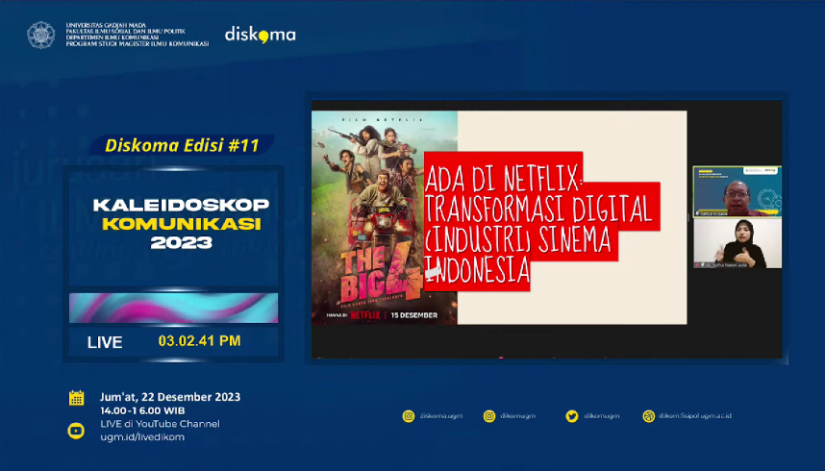
Yogyakarta, December 26th 2023─Towards the end of 2023, many things have happened around the world of communication. The emergence of issues in communication, especially in the digital world, gives a big picture of the nation’s readiness to welcome technological developments. Department of Communication Studies, Faculty of Social and Political Sciences UGM summarized a series of issues in the scope of communication that are important to discuss in the “Communication Kaleidoscope 2023” on Friday (22/12).
The formulation of the Electronic Information and Transaction Law (UU ITE) by the Ministry of Communication and Information Technology (Kemenkominfo) is intended as one of the policy instruments of the digital world. Since 2008, ITE Law has been designed to regulate internet usage and digital transactions in e-commerce. Furthermore, the focus on selecting internet content began in 2016, when the internet was not as fast as it is today. Then in 2020, Kemekominfo issued a regulation for every digital platform to register its services so that they can be accessed by the public. Controversy began to emerge when several applications and digital services were blocked by the Ministry of Communication and Information in 2022.
“One of the basics of the ITE Law that also reaps the pros and cons is when every digital platform is told to register. The preparation was indeed two years, notified in 2020 and then 2022 began to be blocked. But the problem is, is the Ministry of Communication and Information really able to monitor so many platforms and digital content,” said Engelbertus Wendratama, a researcher at the Media Regulatory Monitor and Regulator. The proliferation of digital content on social media and other platforms makes the supervisory function less effective if only carried out by one institution.
Not yet finished with the issue of service licenses, several articles in the ITE Law are considered unclear and are often used by some individuals to obtain legal justification. Since the revision of the ITE Law in 2016 on defamation, complaints related to insult and defamation cases have been reported. When someone expresses an opinion that contains hatred, criticism, or commotion, the offended party immediately brings the case to court. The rise of these complaints indicates that the ITE Law is being misused.
“In comparison, in developed democracies, it is called defamation if what I say is wrong. Well, in the ITE law it is not yet firm. Most of them are from officials. This is also questionable in terms of democracy. Officials are supposed to accept criticism and public opinion,” added Wendra. For the umpteenth time, the ITE Law has been revised again this year by clarifying the articles of insult and defamation, adding articles on child protection, and the authority of Civil Servant Investigators (PPNS).
Apart from the ITE Law regulation issue, the good news for the world of communication is the development of the dynamics of Indonesian cinema after the pandemic. For three years, people were forced to stay at home, including watching movies. But apparently this does not make theaters abandoned. Igak Satrya Wibawa, a lecturer at Airlangga’s Department of Communication Sciences, explained that the film industry has experienced several changes in trends and followed the digital transformation.
“Do viewers still miss movie theaters after the pandemic? The data states that 64.1% of viewers still want to go to the movies. But this is interesting, because almost 75% stated that they are much more comfortable watching streaming. Despite preferring streaming, they said they would still go to the movies. This means that there are some things that are irreplaceable in theaters,” said Igak. The digital era creates competition that is more than just buying and selling goods, but how each user can personify these goods.
Now some movies are no longer shown in theaters, but only on some paid apps like Netflix, iQIYI, VIU, and others. They offer cheap, convenient and easy home viewing services. Even so, movie theaters still have an irreplaceable selling point. The sensation of watching together on a big screen with snack service, sofa options, and even various premium service options cannot be obtained from other places. This is what makes the Indonesian movie industry market well diversified.
The existence of the digital world is inevitable. The many controversies that arise show that society is not ready to accept such rapid changes. But on the other hand, the developments and processes that occur also show strong commitment and extraordinary adaptability. Keep in mind, realizing a safe digital ecosystem is not only the task of the government in making policies, but also the wisdom of users in accessing digital services.
